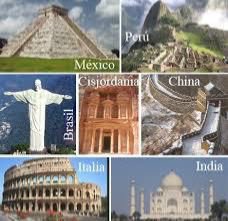Wonders of the World
The seven wonders of the World

The list of the seven wonders of the ancient world was prepared by the Hellenes. Those monuments that were worthy of being visited by the Hellenes, and were also notable for the creation and ingenuity of humanity, included them in that list. They did not pick up any natural wonder or ruin no matter how great it was. The list of the seven wonders of the ancient world is:
The Great Pyramid of Gizeh: is located in Giza, Egypt. It was built by the pharaoh Khufu and completed in 2570 BC. C.
The hanging gardens of Babylon: they were located in the city of Babylon, the current Iraq. Built between 605 BC-562 BC they did not last beyond 126 BC It was destroyed by the Parthians.
The Temple of Artemis: it was located in Ephesus, in what is now Turkey. It existed between 550 BC and 356 BC It was rebuilt by Alexander the Great after an arson and finally destroyed by the Goths in the year 262.
The statue of Zeus in Olympia: it was located in Olympia, Greece, inside the temple dedicated to Zeus. It was sculpted by Phidias in 430 BC. It disappeared between 393 and 426.
The Mausoleum of Halicarnassus: it was located in the ancient Greek city of Halicarnassus, which corresponds to the current Bodrum in Turkey today. It was built around 353 BC and lasted until 1404 due to a series of earthquakes that turned it into a ruin.
The Colossus of Rhodes: it was located at the entrance of the port of the Greek city of Rhodes, on the island of Rhodes. It was the most ephemeral wonder being demolished by an earthquake, since it stood from 282 BC to 223 BC
The lighthouse of Alexandria: it was located in the city of Pharos, in Alexandria (Egypt). The tower of Pharos gave the generic name to the towers of dedicated to give signals for navigation. It was built between 285 a. C. and 247 a. C. An earthquake between the years 1303 and 1323 reduced them to rubble and these remains were reused in 1480 for the construction of a fortress in the vicinity.
The only one of the Seven Wonders of the Ancient World that remains standing today is the Great Pyramid of Giza.
The Seven Wonders of the Modern World
The New Seven Wonders of the World was an international competition promoted by the company New Open World Corporation. To choose the Seven Monuments, a system of voting by Internet and by SMS was used. The winning monuments were:
Chichen Itza (Yucatan, Mexico)
The Colosseum (Rome, Italy)
The Christ the Redeemer (Rio de Janeiro, Brazil)
The Great Wall of China
Machu Pichu (Cuzco, Peru)
Petra (Jordan)
Taj Mahal (Agra, India) )
The choice of these Seven Wonders received numerous criticisms. Unesco did not give endorsement for this campaign considering that it was a media campaign and a personal title for the owner of the company. There were criticisms when considering that it was an economic campaign, or even art scholars declared that artistic merit can not be chosen by vote.